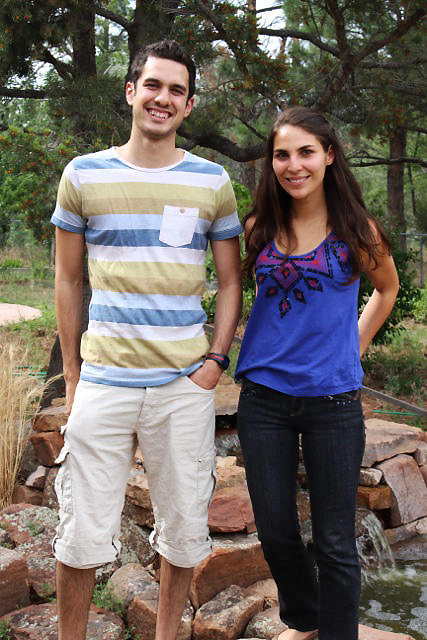 Fernando Mayani and Jessica Thompson, both from Mexico, and currently working as interns in Bandelier’s bird banding program. Courtesy/PEEC
Fernando Mayani and Jessica Thompson, both from Mexico, and currently working as interns in Bandelier’s bird banding program. Courtesy/PEECPEEC NEWS
Mexico is one of the most biologically and culturally diverse countries in the world. These two categories, culture and nature have gone hand-in-hand throughout history in Mexico, nature being fundamental to Mexican cultural development and vice versa.
In a free presentation at the Pajarito Environmental Education Center (PEEC) at 7 p.m. Wednesday, Aug. 27, two interns from Mexico, currently working at Bandelier, will take you back in time for an overview of how Mexican culture has changed throughout the years in its relationship with nature. The presentation will explore the impact of modern society on biodiversity, as well as outline some recent conservation efforts to save the natural beauty of Mexico.
Biologically, Mexico is one of the five “megadiverse” countries in the world, with 12 percent of the planet´s biodiversity. Mexico is in first place for reptile richness, second for mammals, and fourth for amphibians and plants. It occupies the eighth place for avian diversity with 1,060 species, 16 percent being endemic. Culturally, Mexico has 65 ethnic groups and 32 cultural sites considered World Heritage Sites by UNESCO.
Hosts for the program at PEEC will be Mayani is a biologist from the Faculty of Sciences, National Autonomous University of Mexico (UNAM), in Mexico City. As an undergrad, Mayani focused his studies on Animal Behavior, working on egg camouflage in the blue-footed booby at Isla Isabel, Nayarit, Mexico.
He has also done volunteer work in conservation programs, in the Yucatan with marine turtles, and in Chiapas, monitoring different species such as the quetzal and the horned guan. Mayani also participated in a water quality study of the Montebello lakes.
Mayani plans in the future to pursue conservation behavior, which applies the study of animal behavior to conservation programs. His hobbies are playing soccer, volleyball, scuba diving and playing drums.
Thompson is a Mexican biologist from the National Autonomous University of Guadalajara. Since finishing her undergraduate studies, Thompson has been working as a volunteer on projects that involve the study of bird territories, life history and conservation.
She has participated in an owl monitoring program in Central Oaxaca, bird surveys near Puerto Vallarta, and in a migratory warbler study in Chamela, Jalisco. She has also spent several months working on the Manu Bird Project in Peru.
Thompson plans to keep learning about birds’ natural history and ecology, and to participate in conservation programs. In her spare time, Thompson enjoys reading, spending time in the outdoors, and birding.
The talk is free to attend, and no registration is required. For more information about this and other PEEC programs, visit www.PajaritoEEC.org, email Programs@PajaritoEEC.org or call 505.662.0460.

